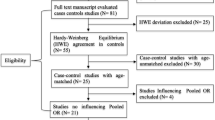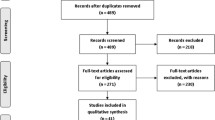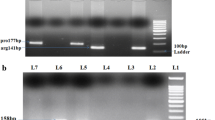Abstract
p53 polymorphic variants play an important role in the determination of tumor phenotype and characteristics in breast cancer. In this study, we examined three common polymorphisms in p53 gene and their haplotype combinations to assess their potential association with inherited predisposition to breast cancer development, in relations with the protein over-expression and patients’ demographic data. A total of 99 patients with breast cancer and 107 age-matched healthy controls were included in the study. Genotypes were determined using PCR-RFLP and DNA sequencing techniques. Evaluation of p53 protein over-expression was also examined by immunohistochemistry. Among three polymorphisms, increased codon 72 Pro allele frequency (p = 0.0067) and the presence of Pro allele were found to be significantly associated with breast cancer (p = 0.013). A significant risk was also found in subjects with combinations of specific haplotypes and genotypes. Most of breast cancer women especially younger than 50 years carry at least one p53 polymorphism (p = 0.001). There was no any association between these three p53 polymorphisms and the protein over-expression, separately or in interaction, with breast cancer. In conclusion, presence of proline allele at codon 72 alone, and its special combinations with other two polymorphisms appear to be a significant risk factor for breast cancer. Determination of well-known p53 polymorphisms might be a good predictor for breast cancer development especially in women younger than 50 years.

Similar content being viewed by others
References
Dunning AM, Healey CS, Pharoah PD et al (1999) A systematic review of genetic polymorphisms and breast cancer risk. Cancer Epidemiol Biomarkers Prev 8:843–854
Levine AJ, Momand J, Finlay CA (1991) The p53 tumour supressor gene. Nature 351:453–456
Nigro JM, Baker SJ, Preisinger AC et al (1989) Mutations in the p53 gene occur in diverse human tumour types. Nature 342:705–708
Olivier M, Langerod A, Carrieri P et al (2006) The clinical value of somatic TP53 gene mutations in 1,794 patients with breast cancer. Clin Cancer Res 12:1157–1167
Olivier M, Eeles R, Hollstein M et al (2002) The IARC TP53 Database: new online mutation analysis and recommendations to users. Hum Mutat 19:607–614
Weston A, Pan CF, Ksieski HB et al (1997) p53 haplotype determination in breast cancer. Cancer Epidemiol Biomarkers Prev 6:105–112
Wang-Gohrke S, Rebbeck TR, Besenfelder W et al (1998) p53 germline polymorphisms are associated with an increased risk for breast cancer in German women. Anticancer Res 18:2095–2099
Papadakis EN, Dokianakis DN, Spandidos DA (2000) p53 codon 72 polymorphisms as a risk factor in the development of breast cancer. Mol Cell Bio Res Comm 3:389–392
Kalemi TG, Lambropoulos AF, Gueorguiev M et al (2005) The association of p53 mutations and p53 codon 72, Her 2 codon 655 and MTHFR C677T polymorphisms with breast cancer in Northern Greece. Cancer Lett 222:57–65
Sjalander A, Birgander R, Hallmans G et al (1996) p53 polymorphisms and haplotypes in breast cancer. Carcinogenesis 17:1313–1316
Dumont P, Leu JIJ, Pietra ACD et al (2003) The codon 72 polymorphic variants of p53 have markedly different apoptotic potential. Nat Genet 33:357–365
Marin MC, Jost CA, Brooks LA et al (2000) A common polymorphism acts as an intragenic modifier of mutant p53 behaviour. Nat Genet 25:47–54
Gemignani F, Moreno V, Landi S et al (2004) A TP53 polymorphism is associated with increased risk of colorectal cancer and with reduced levels of TP53 mRNA. Oncogene 23:1954–1956
Peller S, Kopilova Y, Slutzki S et al (1995) A novel polymorphism in intron 6 of the human p53 gene: a possible association with cancer predisposition and susceptibility. DNA Cell Biol 14:983–990
Weston A, Wolff MS, Morabia A (1998) True extended haplotypes of p53: indicators of breast cancer risk. Cancer Genet Cytogenet 102:153–154
Sjalander A, Birgander R, Kivela A et al (1995) p53 polymorphisms and haplotypes in different ethnic groups. Hum Hered 45:144–149
Wu X, Zhao H, Amos CI et al (2002) p53 genotypes and haplotypes associated with lung cancer susceptibility and ethnicity. J Natl Cancer Inst 94:681–690
Elston CW, Ellis IO (1991) Pathological prognostic factors in breast cancer: experience from a long study with long term follow-up. Histopathology 19:403–410
Singletary SE, Allred C, Ashley P et al (2002) Revision of the American Joint Committee on Cancer Staging System for breast cancer. J Clin Oncol 20:3628–3636
Soong R, Iacopetta BJ (1997) A rapid and nonisotopic method for the screening and sequencing of p53 gene mutations in formalin-fixed, paraffin-embedded tumors. Mod Pathol 10:252–258
John SW, Weitzner G, Rozen R et al (1991) A rapid procedure for extracting genomic DNA from leukocytes. Nucleic Acid Res 19:408
Rockefeller University software database. [Updated 2006 May 11; cited 2007 June 15] Available from: http://linkage. rockefeller.edu/ ott/eh.html
Khadang B, Fattahi MJ, Talei A et al (2007) Polymorphism of TP53 codon 72 showed no association with breast cancer in Iranian women. Cancer Genet Cytogenet 173:38–42
Franekova M, Zubor P, Stanclova A et al (2007) Association of p53 polymorphisms with breast cancer: a case-control study in Slovak population. Neoplasma 54:155–161
Buyru N, Tigli H, Dalay N (2003) p53 codon 72 polymorphism in breast cancer. Oncol Rep 10:711–714
Langerod A, Bukholm IRK, Bregard A et al (2002) The TP53 Codon 72 polymorphism may affect the function of TP53 mutation in breast carcinomas but not in colorectal carcinomas. Cancer Epidemiol Biomarkers Prev 11:1684–1688
Suspitsin EN, Buslov KG, Grigoriev MY et al (2003) Evidence against involvement of p53 polymorphism in breast cancer predisposition. Int J Cancer 103:431–433
Wang-Gohrke S, Becher H, Kreienberg R et al (2002) Intron 3 16 bp duplication polymorphism of p53 is associated with an increased risk or breast cancer by the age of 50 years. Pharmacogenetics 12:269–272
Wegman P, Stal O, Askmalm MS et al (2006) p53 polymorphic variants at codon 72 and the outcome of therapy in randomized breast cancer patients. Pharmacogenet Genomics 16:347–351
Tan XL, Popanda O, Ambrosone CB et al (2006) Association between TP53 and p21 genetic polymorphisms and acute side effects of radiotherapy in breast cancer patients. Breast Cancer Res Treat 97:255–262
Costa S, Pinto D, Pereira D et al (2008) Importance of TP53 codon 72 and intron 3 duplication 16 bp polymorphisms in prediction of susceptibility on breast cancer. BMC Cancer 8:32
Bartley AN, Ross DW (2002) Validation of p53 immunohistochemistry as a prognostic factor in breast cancer in clinical practice. Arch Pathol Lab Med 126:456–458
Rolland P, Spendlove I, Madjid Z et al (2007) The p53 positive Bcl-2 negative phenotype is an independent marker of prognosis in breast cancer. Int J Cancer 120:1311–1317
Yamashita H, Toyama T, Nishio M et al (2006) p53 protein accumulation predicts resistance to endocrine therapy and decreased post-relapse survival in metastatic breast cancer. Breast Cancer Res 8:R48
Roos MA, de Bock GH, de Vries J et al (2007) p53 overexpression is a predictor of local recurrence after treatment for both in situ and invasive ductal carcinoma of the breast. J Surg Res 140:109–114
Kai K, Nishimura R, Arima N et al (2006) p53 expression status is a significant molecular marker in predicting the time to endocrine therapy failure in recurrent breast cancer: a cohort study. Int J Clin Oncol 11:426–433
Gammon MD, Hibshoosh H, Terry MB et al (1999) Cigarette smoking and other risk factors in relation to p53 expression in breast cancer among young women. Cancer Epidemiol Biomarkers Prev 8:255–263
Acknowledgements
The authors cordially appreciate Dr. Fikret Dusunceli’s assistance for collecting the samples of healthy control objects, Prof. Berrak C. Yegen for her critical revision of the manuscript.
Author information
Authors and Affiliations
Corresponding author
Additional information
The study was supported by a grant from Marmara University Scientific Research Foundation (BAPKO, SAG-068).
Rights and permissions
About this article
Cite this article
Akkiprik, M., Sonmez, O., Gulluoglu, B.M. et al. Analysis of p53 Gene Polymorphisms and Protein Over-expression in Patients with Breast Cancer. Pathol. Oncol. Res. 15, 359–368 (2009). https://doi.org/10.1007/s12253-008-9129-6
Received:
Accepted:
Published:
Issue Date:
DOI: https://doi.org/10.1007/s12253-008-9129-6




